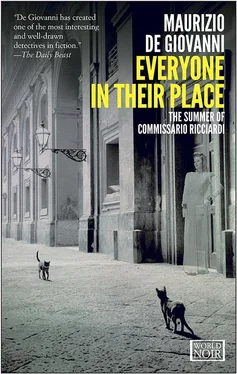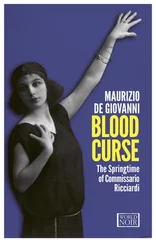Maurizio de Giovanni - Everyone in Their Place
Здесь есть возможность читать онлайн «Maurizio de Giovanni - Everyone in Their Place» весь текст электронной книги совершенно бесплатно (целиком полную версию без сокращений). В некоторых случаях можно слушать аудио, скачать через торрент в формате fb2 и присутствует краткое содержание. Жанр: Исторический детектив, Полицейский детектив, на английском языке. Описание произведения, (предисловие) а так же отзывы посетителей доступны на портале библиотеки ЛибКат.
- Название:Everyone in Their Place
- Автор:
- Жанр:
- Год:неизвестен
- ISBN:нет данных
- Рейтинг книги:4 / 5. Голосов: 1
-
Избранное:Добавить в избранное
- Отзывы:
-
Ваша оценка:
- 80
- 1
- 2
- 3
- 4
- 5
Everyone in Their Place: краткое содержание, описание и аннотация
Предлагаем к чтению аннотацию, описание, краткое содержание или предисловие (зависит от того, что написал сам автор книги «Everyone in Their Place»). Если вы не нашли необходимую информацию о книге — напишите в комментариях, мы постараемся отыскать её.
Everyone in Their Place — читать онлайн бесплатно полную книгу (весь текст) целиком
Ниже представлен текст книги, разбитый по страницам. Система сохранения места последней прочитанной страницы, позволяет с удобством читать онлайн бесплатно книгу «Everyone in Their Place», без необходимости каждый раз заново искать на чём Вы остановились. Поставьте закладку, и сможете в любой момент перейти на страницу, на которой закончили чтение.
Интервал:
Закладка:
The arrangement of the objects suggested that the woman must have gone out in a hurry, leaving her dressing table in disarray and her armoire half-open. As if reading his thoughts, Concetta, who was standing in the doorway, whispered:
“She always left things higgledy-piggledy, the duchess. For all she cared, after all we were there to tidy up after her. But now, I can’t say why, it gives me a strange feeling to enter this room. Not in the anteroom, even though there’s still blood on the sofa, and it won’t come out. But here, I get that strange feeling.”
Ricciardi made a sign to Maione, who opened the drawers of the nightstand. In the first drawer, atop the linen and underwear in plain sight, sat a bundle of letters tied together with a blue ribbon. The brigadier hefted them with one hand, after rifling through them quickly.
“They’re all signed ‘yours, Mario.’ She certainly didn’t seem to be particularly afraid that anyone might see them, eh, the Signora?”
Concetta didn’t seem surprised. She shrugged.
“And who would have seen them? The duke and the young master have never set foot in here. I don’t look at that sort of thing and Mariuccia doesn’t know how to read. She could have tacked them up on the walls and it wouldn’t have changed a thing.”
Ricciardi sensed the disapproval more in the words than in the tone of voice. It struck him as sarcasm, not resentment. Of course, you could never be certain.
“Aside from the duke and his son, and the duchess of course, who else came into this room?”
Concetta shot an eloquent glance at the letters still in Maione’s hand, and then she said:
“How would I know, Commissa’? I go to bed early at night, I already told you. And the Signora had the padlock keys.”
We get it, thought Ricciardi. “Yours, Mario” had access to the bedroom, as well as the heart, of the lovely duchess.
“All right. Don’t touch anything in here, leave it exactly as it is, until you hear otherwise from us. Now announce us to the duke.”
After a sleepless night, dominated by the thought of Ricciardi who had waited in vain for her to appear at the window, Enrica arose the next morning grim and determined. If her sweet disposition and her upbringing had both conspired to keep her from being openly rude to her guests the night before, now she had made up her mind to have it out with her parents. She would not only tell them that Sebastiano did not interest her in the slightest, but she would also forbid them, from that day forward, to plot behind her back again, even if they thought they were doing it for her own good. Guessing at her intentions, however, her mother had left the apartment at dawn, telling the housemaid that she was going to pay a call on a cloistered aunt, a nun; her father, moreover, had left for the shop at least an hour earlier than his usual time of departure.
All right then, thought Enrica. Then I’ll come see you, my dear Papà; I’m really interested to see what you have to say for yourself.
Nonetheless, she tended to her household duties, and it was only after she’d washed up, done the grocery shopping, and given instructions for lunch that she changed her clothes, put on her hat, and set out for the shop on the Via Toledo.
XV
The bedroom where Matteo Musso, duke of Camparino, was losing his final battle was immersed in shadow. You could smell the aromas of disinfectant and putrefaction, lye and stale urine, medicine and dust. Ricciardi recognized the stench of death.
Once their eyes became accustomed to the dark, the two policemen distinguished a silhouette in the bed, the source of the rhythmic gasping they’d heard when they entered. It would seem that the duke was asleep. Suddenly, however, a raucous voice said: “Conce’, open the shutters just a little. Let me see who’s come to call on me.”
The woman moved soundlessly in the darkness, demonstrating that she had a perfect knowledge of the arrangement of furniture and objects, and opened the window just a crack. A shaft of light entered the room, illuminating Ricciardi and Maione like a spotlight in the night.
“Your grace. My name is Ricciardi and I’m a Commissario of Public Safety. This is Brigadier Maione, with me. First of all, my condolences for your loss.”
The vague shadow had taken on some outlines. On the pillow lay a skull, hollowed out cheeks and eyes, a shiny bald cranium; an exceedingly skinny neck sank under the sheets, from which protruded a parchment-like arm. The hand looked like the talons of some bird of prey, the yellowish fingers wiggled slowly.
“Forget about that. A stranger has died here, what should I care about it? Be seated. Conce’, make the Commissario and the Brigadier comfortable.”
His voice sounded like the rasping of a metal file on sandpaper. It sent shivers down your back. The heat in the bedroom was tremendous.
“Please, don’t go to any trouble, Signora, grazie . We’ll only be here a short while, just a few questions, if you have no objection, your grace.”
Once again the hand waved softly, as if giving permission. Maione decided that over time, the duke had gotten used to expressing himself in this fashion, with gestures, to save his breath. Ricciardi went on:
“When was the last time you saw the duchess?”
There were a few moments of silence. Just when the commissario was starting to think that the duke must have fallen asleep, the scratchy voice said:
“Have you ever spoken to a dead person before, Commissario?”
This time it was Ricciardi’s turn to be left breathless. Just like that, point blank, that question. As if the duke had possessed, from his deathbed of pain, the faculty of peering through the darkness and into his soul.
“What do you mean by that?”
The tone of voice was harsher than he meant it to be, but the duke hardly seemed to notice.
“You can see with your own eyes exactly what I mean. I’m a dead man, Commissa’. Not today, not tomorrow, or whenever they carry me out of here. I died when my wife passed away. Not this one, of course. My wife, my real wife.”
With some effort, Ricciardi had resumed breathing normally. A metaphor. It had been nothing but a metaphor.
“Why do you say that, your grace? And if I may venture to ask, what does it have to do with my question?”
“It has a great deal to do with it, Commissario. A man dies at the very moment that his life no longer means anything to anyone else. And the last person I had any meaning for was Carmen. I died when she died.”
Ricciardi didn’t know what to say, so he just waited.
“Right now, you’re talking to a dead man. It’s a novel experience, isn’t it?”
You have no idea, thought Ricciardi. The duke went on:
“A dead man doesn’t deserve affection or care. He’s just there to be exploited for his possessions, for his money. Every so often, maybe, you might bring him a flower. The woman you’re talking about, Commissario, the last time she came into this room was at Easter. She came in laughing, she threw open the windows and let in a gust of cold air. She looked at me and she started laughing again; if you ask me, she was drunk. She said, it’s Easter Sunday, Christ is risen, why don’t you get up, too? She put a bunch of flowers into a vase, on that dresser, and then she left. Who knows who even gave her those flowers. I couldn’t tell you when the time before that was.”
The effort that it took the man to go on talking must have been enormous. His sentences were fragmentary, and he had to catch his breath every third or fourth word. Maione felt an urge to leave: the heat, the stench, and the discomfort he felt as he listened to the duke were becoming intolerable. But Ricciardi seemed willing to go on asking questions.
Читать дальшеИнтервал:
Закладка:
Похожие книги на «Everyone in Their Place»
Представляем Вашему вниманию похожие книги на «Everyone in Their Place» списком для выбора. Мы отобрали схожую по названию и смыслу литературу в надежде предоставить читателям больше вариантов отыскать новые, интересные, ещё непрочитанные произведения.
Обсуждение, отзывы о книге «Everyone in Their Place» и просто собственные мнения читателей. Оставьте ваши комментарии, напишите, что Вы думаете о произведении, его смысле или главных героях. Укажите что конкретно понравилось, а что нет, и почему Вы так считаете.












